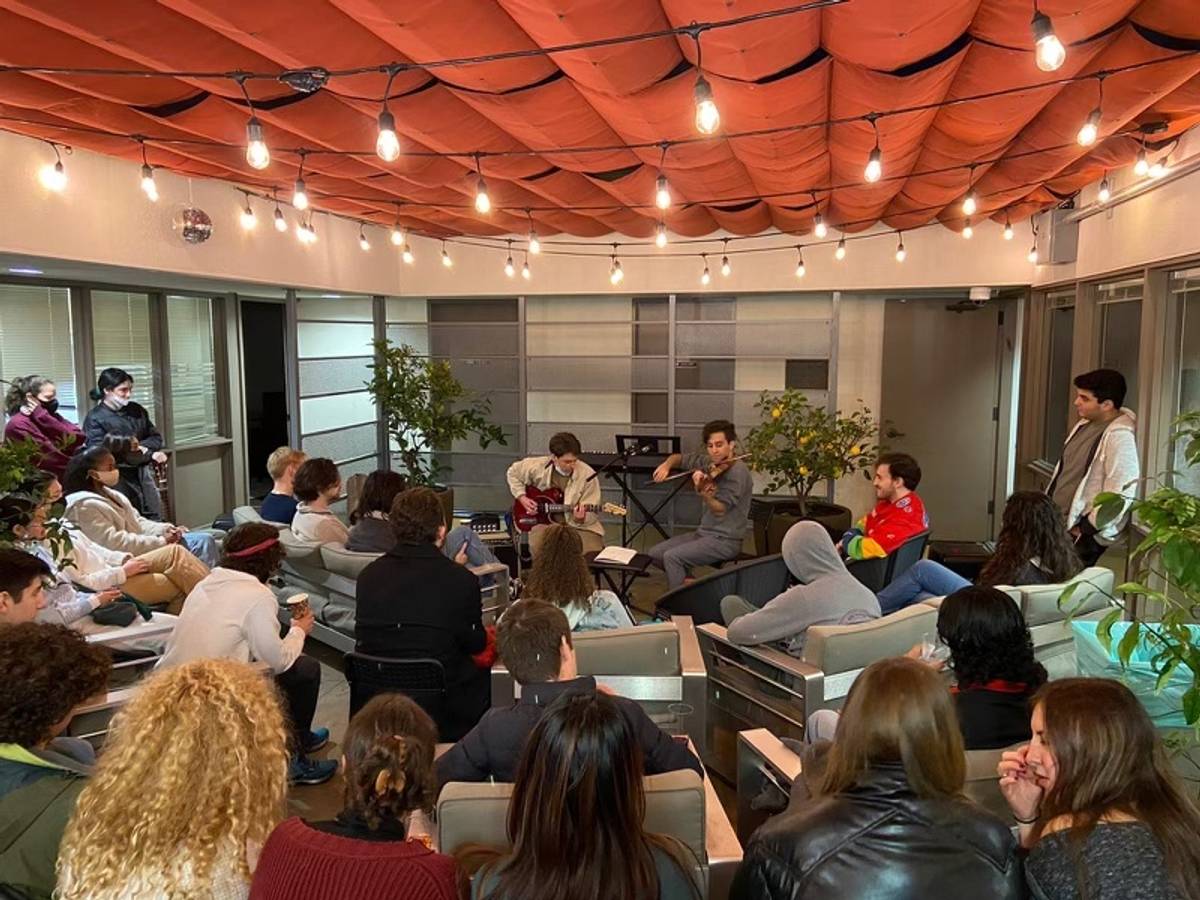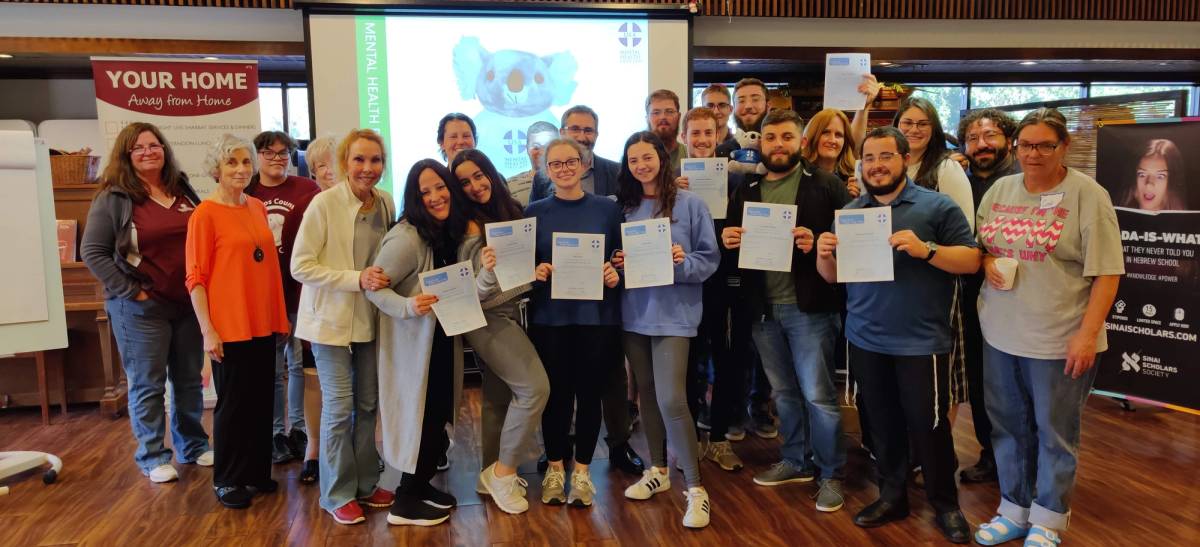Addressing Mental Health on Campus
As students’ needs have increased during the pandemic, Chabads and Hillels have stepped up their response




Nearly six years ago, Hillel professionals at the University of Southern California recognized the need to prioritize mental health on campus, as students began requesting support from staff members with whom they had forged trusting relationships. Even though USC Hillel staff helped students work through some issues, they lacked the clinical expertise of licensed mental health professionals.
“On college campuses, students feel pressured by high expectations to perform,” said Dave Cohn, USC Hillel executive director. “During the COVID pandemic,” he added, “we only have seen these issues amplify.”
USC is not alone. A campus rabbi in the Boston area confidentially shared these observations with Tablet: After two years of COVID-19 isolation, students are struggling socially, experimenting more with sex and drugs, engaging in more intense dormitory arguments, exhibiting increased maladaptive coping behaviors such as eating disorders, and having more trouble dealing with rejection. Meanwhile, few therapist appointments are available, many therapists are not accepting insurance, and because of cross-state telehealth licensing regulations in some states, students who have existing relationships with therapists in their home states cannot Zoom with them from school.
The mental health of college students across the U.S. consistently declined between 2013 and 2021, reports the Healthy Minds Network, a research organization that studies adolescent and young adult mental health. Recent findings indicate an overall 135% increase in depression, 110% increase in anxiety, and double the number of students with one or more mental health problems. Students are often uncomfortable seeking help because of the perceived stigma, while campus counseling centers are strained by the steadily climbing rates of anxiety and depression.
“Research validates what Hillel professionals are hearing on the ground, which is that students, even once back in-person, are feeling isolated, lonely, and are searching for connection, meaning, and a sense of belonging,” said Leah Siskin Moz, senior director of wellness at Hillel International. “Building friendships, feeling cared for by a mentor, connecting to something larger than yourself, and making meaningful contributions to the community around you are mental health protective factors that are built into the fabric of Hillel.”
Hillel International makes available mental health warning-sign training to all Hillel staff. To date, over 700 professionals from 130 Hillels have completed the training through the interactive Kognito simulation platform. “The mental health response component is included in our wellness work because of the role students have given Hillel staff in being part of the support networks they are building for themselves,” said Siskin Moz.
Today, campus Hillels and Chabads are as likely to serve up mental health and wellness services as bagel brunches and Shabbat dinners. The rationale: These are safe spaces where students are comfortable requesting help because they have already formed meaningful connections with the people who work there; staffers are trained as first responders, or “gatekeepers,” and can engage in supportive conversations with students, identifying when referral to mental health resources is appropriate. Some centers of Jewish life employ on-site professional therapists and/or wellness directors; others partner with social service agencies for clinical services.
USC Hillel launched the Bradley Sonnenberg Wellness Initiative in 2019 through the support of Glenn and Andrea Sonnenberg—in memory of their son Bradley—with a Cutting Edge Grant from the Jewish Community Foundation of Los Angeles. It offers free one-on-one professional counseling, psychotherapy referral services, and peer-to-peer support to any USC student, regardless of religious identity (Jewish and non-Jewish alike), who comes to Hillel. The goal is to provide an integrative program incorporating therapy and a holistic wellness approach with activities designed to reduce stress and promote self-care such as yoga, mindfulness, and cooking.
“It’s incredibly fulfilling to meet people, create bonds, plan events, and create self-care habits that have helped me to maintain a balance,” said Jessie Cooper—a rising junior and incoming vice president of wellness at USC Hillel—who, through this initiative, found a community of peers who understand each other’s struggles, share similar stresses such as grade anxiety, and are able to support each other.
“Hillel offers a Jewish community for people to feel comfortable, to find people who are like them … You see that there are other people like you who are stressed out,”said Andrea Sonnenberg, whose son died in 2017 at age 21 from psychiatric drug interactions after a lifetime struggle with mental health. She has since become a mental health advocate; her podcast, Getting Thru: Stories of Resilience, addresses mental health among young adults, showcasing those who have overcome mental health challenges.
Last year, USC Hillel served nearly 2,000 students, promoting wellness content and programs to 900 of them via social media and e-newsletters. Approximately 250 students attended wellness programs and activities such as a gratitude workshop based on Jewish gratitude practices. Hillel’s on-site clinician provided 96 face-to-face therapy hours to 22 students (primarily undergraduates) dealing with such issues as sexual assault on campus, anticipating post-graduation life, self-care, work/life balance, and impostor syndrome.
This fall, a cohort of approximately 18 USC undergraduates will participate in the Wellness Learning Fellowship designed by USC Hillel professionals and lay leadership to promote mental health and holistic well-being. Piloted this past spring, the curriculum—which will be available to other Hillels—incorporates Jewish text study with modern psychology. Students will meet for 1.5 hours weekly for 10 weeks, with group and hevruta (study partner) discussions. “I hope that it becomes a nerve center of how wellness is transmitted as a value across our campus culture,” said Cohn.
Unlike USC, few campus centers of Jewish life have the financial resources for on-site therapists. Only 10 out of 190 staffed Hillels in the U.S. have dedicated mental health or wellness professionals, with three New York City commuter campus Hillels added this year—thanks to a Jewish Community Response and Impact Fund Reset grant.
Campus Chabads and Hillels often tap into existing resources, such as Jewish Family Service and other social service agencies, campus counseling and wellness centers, and local therapists. “We have a responsibility to connect students with trained support and other resources when it’s needed,” explained Siskin Moz.
UCLA Hillel, for example, partners with its campus Mindfulness Awareness Center and with the JFS/Jewish Federation of Greater Los Angeles Ezra Network initiative that offers students up to 32 hours of free counseling. For 15 years, Chabad at Texas A&M University has referred students to local therapists for clinical services; its partnership with Jewish Family Service Houston provides an eight-hour, CPR-style Mental Health First Aid Training Day where JFS staff teach students how to identify and triage depression, substance abuse, trauma, psychosis, and mood disorders, including how to react in a crisis situation.

Penn Hillel is currently fundraising for an in-house Penn Hillel social worker to be in place by the 2023 school year. Currently, Hillel staff connect students with the University of Pennsylvania’s Counseling and Psychological Services (CAPS)—despite an appointment backlog and student reluctance to work with unfamiliar therapists; in a crisis situation, a Hillel professional calls CAPS or walks the student there. “There needs to be a handoff of the baton from our staff to the psychological staff,” said Rabbi Gabe Greenberg, executive director of Penn Hillel, which requires that staff members attend annually two CAPS “I CARE” training sessions to learn the signs of stress, distress, and crisis; listening techniques; and crisis intervention skills.
Personal relationships are key, emphasizes Greenberg. He says that students are more likely to turn to Hillel staff during a crisis because Penn Hillel has forged deep and meaningful relationships with over 600 students—including thousands of annual “coffee chat” checkups with students at the local Starbucks or during walks around the campus quad: “Through those one-on-one conversations, students are most likely to offer up what they are up to.”
Penn Hillel helped Maya—a member of the class of 2024 who withheld her last name to protect her privacy—cope with loneliness and isolation during her freshman year in 2020 when the campus had gone virtual because of COVID-19. Early on, a Hillel staff member reached out, stayed in touch the entire year, and became like a supportive older sister. “It was really helpful because when I came to Penn, I didn’t know anybody, was far away from home, and was living off campus,” said Maya. “It was very stressful. The staff member from Hillel was a great support system.”
Relationship building is at the core of Chabad on Campus. “Our mission at Chabad on Campus is to support students with the challenge of the day. Rabbis and rebbetzins are on the front lines, hosting, and developing one-on-one relationships,” said Rabbi Avi Weinstein, chief operating officer of Chabad on Campus, which trains these professionals to support struggling students and identify when clinical referral is appropriate. Annual conferences feature a six-hour Mental Health First Aid training workshop and suicide prevention training through the Gelt Charitable Foundation. Its Happiness Factor course—taught by local Chabad professionals at campuses nationwide—is designed to foster strong inner value and self-worth, while connecting to the Chabad community.

At Texas A&M University, co-directors Rabbi Yossi and Manya Lazaroff assess whether students are simply homesick, crave loving support and a bowl of chicken soup, or require crisis intervention and clinical referral. Students in crisis can text the rabbi 24/7. In 2019, the Lazaroffs created ReJOYvenation 360, a comprehensive mental health program that emphasizes joy as an antidote to mental health stress, incorporating mental health workshops and resources. New programs scheduled this year include “Kabbalah of Stress Management” and “Recipes for Success” featuring post-college life guidance from “Aggie” (Texas A&M) alumni.
When Ethan Geller, a recent graduate of the University of Kansas, faced personal, school, and career issues, he turned to Rabbi Zalman Tiechtel, director of Chabad at the University of Kansas, with whom he had developed a mentor relationship. For example, Tiechtel provided him valuable guidance about a difficult job decision. “At first he was a rabbi figure, then he became more my mentor and truly my home away from home,” said Geller, who joined KU Chabad—which launched its mental health program five years ago—as a first-year student, following in his older sister’s footsteps. “He directed me and always helped me choose the correct path, directing me in the ways of Judaism.”
“The first place they go is to us because the campus counseling center is overwhelming. We realize that if we are the first responders, we must have resources and tools for these students,” said Tiechtel. “We are most proud that every Jewish student knows they are not alone.”
The KU program has adopted the ReJOYvenation 360 name but uniquely addresses its own campus needs with mental health awareness and education including: stress-relief seminars, a suicide prevention program, a weekly mental health discussion led by a licensed therapist, counseling and support, as well as a “Help Me” crisis text line and a twice-weekly text check-in via a trivia contest. During the fall and spring semesters, it sponsors a mental health and wellness retreat at a local ranch. “Sources of Strength”—created in fall 2020 in partnership with JFS and offered each semester—trains students to become “Ambassadors of Strength,” as sources of strength for their peers.
There’s a general movement toward equipping non-mental health professionals to support community members, including access to professional mental health services when needed, explains Daniel Eisenberg, principal investigator for the Healthy Minds Network, mental health program director and professor at UCLA’s Fielding School of Public Health’s Center for Health Policy Research. In this regard, Hillel and Chabad professionals who have received high-quality “gatekeeper” training can play a valuable support role in addressing student mental health.
Paula Jacobs is a writer in the Boston area.